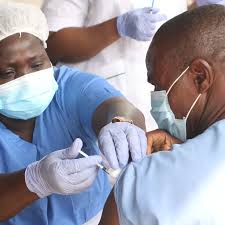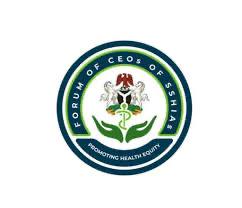Health experts across the country have reiterated that vaccination remains the most effective measure in preventing cerebrospinal meningitis (CSM), especially in Nigeria’s high-risk reglions. This follows a recent alert from the Nigeria Centre for Disease Control (NCDC), which reported a spike in suspected cases of the disease in several northern states.
According to data from the NCDC, between March 17 and 23, 2025, a total of 315 suspected cases of meningitis were recorded in Kebbi, Sokoto, and Yobe States. The agency raised concerns over the rapid spread of the disease and the need for swift interventions to curb its transmission.
To combat the outbreak, the Federal Ministry of Health and Social Welfare has taken delivery of over one million doses of the pentavalent meningococcal conjugate vaccine (Men5CV) from the Gavi-funded global stockpile. The vaccine is expected to boost the country’s efforts in containing the disease, particularly in northern states, which have historically borne the brunt of meningitis outbreaks during the dry season.
Public health professionals have welcomed this development, describing it as timely and crucial in curbing the spread of meningitis, which is known to have high fatality rates when not treated promptly. Dr. Ngozi Felicia Ibe, a public health expert with Botox-Lagos, explained that the newly received Men5CV vaccine protects against five major strains of the meningococcus bacteria, significantly improving the country’s preparedness against future outbreaks.
Dr. Ibe further revealed that targeted immunisation campaigns are already underway, focusing on individuals between the ages of one and 29—an age group considered highly vulnerable to the infection. She emphasized that although CSM can affect people of all ages, children under five, adolescents, and young adults remain at greater risk. Males, according to her, tend to be more affected than females.
She advised Nigerians to adopt proper hygiene practices such as regular hand washing, avoiding close contact with infected individuals, and covering the mouth when coughing or sneezing. These, she said, are essential behavioural changes that can help reduce the spread of the disease. She also underscored the importance of ensuring good ventilation in crowded places like schools, dormitories, and refugee camps.
Dr. Ibe urged health institutions to strengthen surveillance systems that can detect and report CSM cases early, thereby enabling prompt medical response. She added that public health education, community outreach, and strategic media campaigns are necessary tools to raise awareness about the symptoms, risk factors, and preventive measures related to the disease.
According to her, health workers should be adequately trained to identify early signs of CSM and provide timely medical intervention to minimise complications and fatalities. She also called on the government to invest more in the health sector, particularly in diagnostic and treatment facilities, vaccine accessibility, and surveillance systems.
Dr. Ibe appealed to the Federal Government to launch sustained nationwide vaccination campaigns, especially in states with a history of recurring meningitis outbreaks. She also advocated for stronger collaboration with global health organisations such as the World Health Organisation (WHO) to ensure the country has access to the necessary technical support and resources to manage and prevent future epidemics.
She explained that CSM is primarily spread through respiratory droplets when an infected person coughs or sneezes. Transmission can also occur through close contact or sharing items like utensils and cups, particularly in overcrowded living conditions. To reduce the risk, she advised the public to maintain personal hygiene, practise social distancing during outbreaks, and avoid overcrowded areas.
Highlighting the signs of CSM, she noted that symptoms include high fever, headache, stiff neck, sensitivity to light, and in some cases, confusion. She urged individuals to seek immediate medical help when symptoms are observed and to ensure that they and their families are vaccinated, especially if they reside in high-risk regions or fall within vulnerable age groups.
Adding his voice, Dr. Adefolarin Opawoye, a Consultant in Infectious Diseases at the Lagos University Teaching Hospital (LUTH), confirmed that CSM is often caused by bacterial infections such as Neisseria meningitidis and Streptococcus pneumoniae, as well as certain viruses. He stressed that symptoms could also include vomiting, light sensitivity, and mental disorientation. Dr. Opawoye echoed the need for increased vaccination coverage and urged the use of mass media platforms to spread awareness through radio jingles, TV broadcasts, flyers, and grassroots mobilisation.
Ajunmobi Temitayo, a psychiatric social worker at the Federal Neuro-Psychiatric Hospital, Yaba, Lagos, explained that bacterial meningitis is treated with antibiotics, while viral meningitis often requires supportive care. She emphasized that early detection remains crucial, as delayed treatment can lead to severe complications or death. According to her, CSM symptoms can vary based on the cause but generally include fever, headache, neck stiffness, sensitivity to light, vomiting, confusion, and in some cases, seizures or rashes. For infants, signs such as irritability, refusal to feed, and bulging soft spots on the head should prompt immediate medical attention.
She urged Nigerians to remain vigilant, particularly during the dry season when meningitis tends to peak. Public health officials also encouraged citizens to adhere strictly to guidelines issued by the NCDC and other relevant authorities in order to curb the spread of the disease and protect communities.
With health experts sounding the alarm and the government ramping up vaccine availability, the hope is that with collective effort and community cooperation, Nigeria can avert a full-scale outbreak and safeguard its population from the devastating impact of cerebrospinal meningitis.







